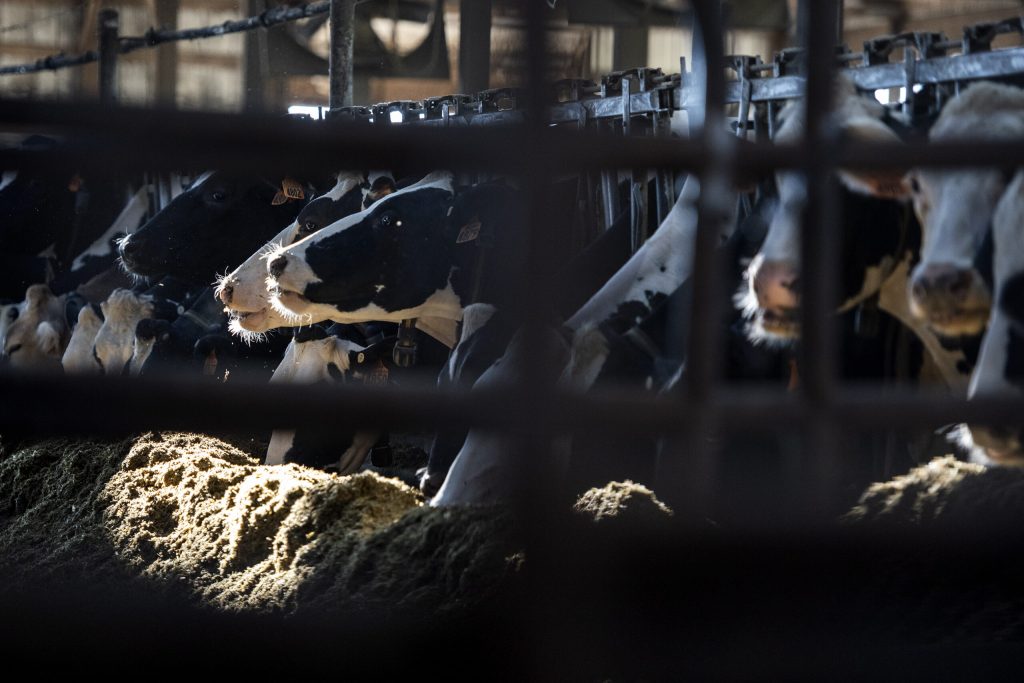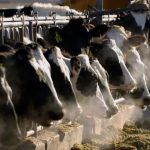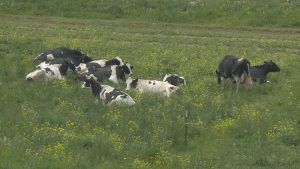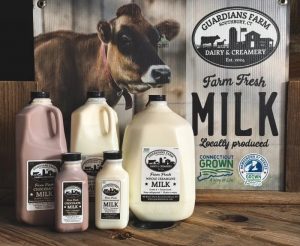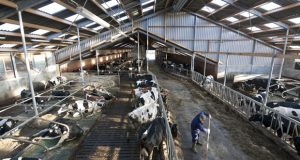
Federal agriculture officials continue to ramp up their response to avian flu in dairy cattle. But in America’s Dairyland, the threat of the virus is mostly in the background for the industry.
Jason Marish is one of the veterinarians at Wisconsin Dairy Veterinary Service in Waupaca County. He said they received an influx of calls after the virus was first found in dairy cows in Texas and Kansas at the end of March.
“Because the disease isn’t that severe in the cattle, (the interest) has dropped off dramatically,” he said. “So it was kind of a flash in the pan.”
The U.S. Department of Agriculture has confirmed the H5N1 virus in 42 herds across nine states, including Michigan. So far, there have been no detections of the virus in Wisconsin.
On Friday, USDA announced farms affected by avian flu could apply for assistance with providing protective equipment to employees, veterinary costs and compensation for lost milk. The agency has also covered the cost of testing for the virus in lactating cows moving between states since issuing a federal order requiring the tests last month.
Marish said this testing has made it more complicated for Wisconsin producers to sell cattle out of state over the last two weeks. But he said it’s not an unusual precaution for the dairy industry.
“There’s lots of regulations going from state to state, whether it be for brucellosis or tuberculosis,” he said. “This is just one more thing that we’re testing for.”
Testing requirement forces farms to do more planning, face new worries
Jackie McCarville is a regional dairy educator for the University of Wisconsin-Madison’s Division of Extension in southwestern Wisconsin. She also feels like concern around avian flu has died down, especially as many farms begin work in their fields this spring.
“But I think it’s still in the back of a lot of minds: what happens if it does get into Wisconsin?” McCarville said. “What considerations should we be looking at? It’s a great time to look at your biosecurity plan to see what you can do to protect your farm.”
She said UW Extension has been working to keep their online resources updated on how farmers can protect their cows and employees. She said most farms already practice safety precautions like handwashing and cleaning equipment.
McCarville said the federal testing requirement has forced farms to do more preparation ahead of cattle sales, especially because some sale barns are taking additional precautions.
“We also know in Michigan, they’re not showing lactating cows,” she said. “It’s going to be interesting as we get into those show seasons with county fairs and other dairy cattle shows, if some of these shows are going to have separate guidelines.”
Mitch Breunig, owner of Mystic Valley Dairy near Sauk City, said he hasn’t had to test his cows because he sells to other Wisconsin farms. But he knows one farm family that is retiring from the industry and had planned to sell their cows at an auction in June.
“They’re nervous about it because they hope their cattle go all over the country,” Breunig said. “It’s kind of their one last chance to sell their genetics and if all of a sudden this comes out of the blue, it just makes it an even more stressful situation.”
He said the virus has also been worrying for farms that send their young cows to be raised in other states like Colorado and Kansas. He said those producers worry the continued spread of avian flu could lead to the restrictions around all cattle moving across state lines.
Breunig said it’s nice to know the new assistance from USDA is there for affected farms, which would otherwise be losing income from milk after going through months of depressed milk prices. He said he hopes to continue to see producers take advantage of testing their herds for the virus.
“I think the more animals that get tested, or the more we find out about this, the better we’ll all be,” he said.
Disease experts say reluctance to testing is biggest threat
But surveillance of avian flu in cows and farm workers has become a contentious issue.
Keith Poulsen, director of the Wisconsin Veterinary Diagnostic Laboratory, said much of the national dairy industry has been opposed to doing more testing for the virus on farms. He said the number of avian flu tests in cattle across the country has actually declined since the federal order requiring them went into place.
Poulsen said testing has gone up in Wisconsin, with his lab processing tests for nearly 200 cows per week. He said that is likely due to a positive relationship between the dairy industry and state agriculture officials, as well as strong enforcement of other regulations.
“We also don’t have virus in the state that we know of, so the chances of (a positive test) are quite low,” he said.
Poulsen said farms are reluctant to test because of a lack of federal guidance around what happens if a cow tests positive for the virus. He said the dairy industry in general is worried about how a widespread virus could hurt consumer confidence in the safety of dairy products, both in the U.S. and internationally.
Food and Drug Administration officials continue to assure consumers that pasteurized dairy products are safe. A federal study of roughly 300 samples from retail dairy products did not find any viable virus, which officials say supports the understanding that pasteurization is effective at killing H5N1.
Poulsen said more surveillance is needed to understand the prevalence avian flu on dairy farms. Without it, he worries the nation’s dairy cows will become endemically infected by the virus and potentailly allow it to spread to other types of livestock like swine.
You can now read the most important #news on #eDairyNews #Whatsapp channels!!!
🇺🇸 eDairy News INGLÊS: https://whatsapp.com/channel/0029VaKsjzGDTkJyIN6hcP1K
